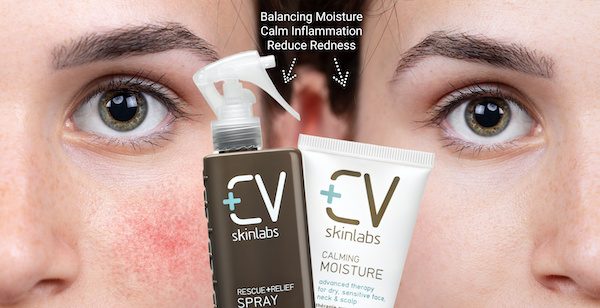
Is your skin stressed out?
You may not be sure, but here’s a clue: if you’re stressed out, your skin probably is too!
So what does that mean in terms of how your skin looks and feels?
Let’s check it out.
What is Stressed-Out Skin?
Scientists have discovered a very clear connection between psychological stress and skin reactions.
Board-certified dermatologist Keira Barr MD, FAAD, states: “Our brain and skin are intimately linked, and they communicate with each other. That means when we experience chronic stress from work, relationships, or current events, the skin is both a target and a source of stress hormones, which can make the skin more vulnerable to itch, inflammation, irritation, and infection.”
We have to remember that skin is an organ, just like the heart, lungs, and kidneys. When we experience stress, the body releases stress hormones like adrenaline and cortisone. As long as the stress subsides fairly quickly, the skin will manage just fine. But during periods of chronic stress—when the stress just won’t go away—these stress hormones can break down the collagen and elastin in the skin, while also interfering with the repairing process.
The result? Premature aging. Signs include more noticeable fine lines and wrinkles, sagging, and bagging.
Stress hormones are also known to increase inflammation. In a recent study, scientists noted that cortisol and other related hormones “have been shown to increase skin inflammation, increase itching, impair skin barrier function, impair wound healing, and suppress immunity.”
The results include:
- Increased acne breakouts
- Skin dryness and dullness
- More reactive, sensitive skin
- Wounds that take longer to heal
- Increased susceptibility to infection
Finally, stress can exacerbate any skin conditions that you may already have. The increase in inflammation commonly brings about eczema, rosacea, and psoriasis flare-ups, and may trigger allergic reactions more easily.
Let’s look at the three main types of stressed-out skin and how you can help your skin cope.
Photo by Karolina Grabowska via Pexels.
Stressed Out Skin 1: Acne
If your skin is already acne-prone, stress is going to make it worse. The hormones released during stressful periods ramp up oil production and increase inflammation—the perfect combination for breakouts.
What to Do?
Use a Clarifying Cleanser
Look for a gentle but clarifying cleanser that will help rid the skin of dirt and impurities, then wash twice a day. Avoid over-washing or harsh scrubbing, as both of these can disrupt the skin enough to cause it to react and produce more oil.
Tone Without Alcohol
It’s still important to use a balancing toner on your skin to help prepare it for your moisturizer. If you use our Rescue + Relief Spray, you’ll receive anti-inflammatory benefits along with balancing benefits that will help your skin recover and look its best. Do avoid toners with alcohol in them, as they are overly drying and may cause your skin to look worse.
Lightly Moisturize
Choose a light moisturizer that will not clog your pores—but do continue to moisturize your skin twice a day. Even oily skin under stress needs moisture to help it calm down and relax. Our Calming Moisture has anti-inflammatory properties to help, yet absorbs quickly and will not clog pores. It will leave your skin with a healthy looking glow!
Spot Treat
Avoid picking at your skin as the oils and dirt on your fingers can make your breakouts worse. Choose a spot treatment with salicylic acid to cover blemishes.
Stressed Out Skin 2: Redness
Redness is a common sign that your skin is stressed out. It’s often directly related to inflammation, or if you’re prone to rosacea, it may signal a flare-up.
What to Do?
Get Rid of Any Products Causing Irritation
Examine your current skincare routine and see if you have any products that may be irritating your stressed-out skin. Now is the time to set those aside until your skin has recovered. Potential irritants include anti-aging serums, retinols, acid-containing products, harsh cleansers, and some makeup products.
Moisturize with an Anti-Inflammatory Formula
Your main job is to reduce the inflammation, so make sure your moisturizer has ingredients in it that will help with that. Our Calming Moisture is made to reduce inflammation. It has aloe, beta-glucan, vitamin E, and ginger to help speed healing and reduce redness and itch.
Calm Skin Throughout the Day
Skin that’s suffering from redness can benefit from frequent treatment with our calming, cooling Rescue + Relief Spray. You can apply it at any time throughout the day and immediately experience its cooling effects. Its clinical-strength ingredients help target and combat skin stress, while water lily purifies and removes heat.
Stressed Out Skin 3: Dry Skin
While some people may experience more oily, acne-prone skin when stressed out, others will find that their skin feels dry and tight. The effects of the stress dehydrate the skin, sapping moisture away. Stress hormones also damage the skin’s outer barrier so it cannot hold on to the moisture it has as well.
What to Do?
Switch to a Creamy Cleanser
Cleansing can easily dry out the skin if you’re not doing it right. Make sure you’re using a gentle, moisturizing, creamy cleanser that is pH-balanced and leaves your skin feeling soft and smooth. If your skin feels tight after cleansing, you have the wrong product.
Tone Immediately After Cleansing
With dry skin, you don’t want to wait to apply toner. Simply pat dry and spray on our Rescue + Relief Spray for instant cooling and gentle moisturizing that prepares your skin for your moisturizer.
Use a Quality Moisturizing Cream
Some creams you can apply and your skin feels dry a half-hour later. These creams do not have the ingredients you need to truly moisturize your skin. Try our Calming Moisture instead, as it contains lipids (fatty acids) and ceramides to help replenish and moisturize the skin. Over time, it will also help repair the skin barrier so the skin can keep more of the moisture it has.
Use a Humidifier
You want to fight dryness at every turn when you’re dealing with dry, stressed-out skin. If you live in a dry climate, try adding a humidifier to your room. It will put moisture back into the air, which will help you to wake up with softer, more supple skin.
Gently exfoliate
Dry skin that is flaking could use a gentle exfoliating treatment. Just be very careful not to go too harsh. You can try using a soft skin brush with circular motions to loosen the flaking or go with a gentle acid exfoliating product. Look for those with salicylic, malic, and glycolic acids.
Tips for All Types of Stressed-Out Skin
No matter what your skin may be doing in response to stress, the following tips will help bring the stress down so your skin can recover.
- Meditation—it helps calm the mind and the stress response in the body.
- Deep breathing—it produces an immediate relaxing effect on your whole system.
- Exercise—exercise is a known stress reliever. Try going for a walk.
- Yoga, and tai chi—these forms of exercise involve deep breathing and relaxing into various poses, and are known to help alleviate stress.
- Acupuncture—if you need help managing your stress, an acupuncture treatment may do the trick.
- Sleep—getting 7-8 hours of sleep per night helps your body recover and repair itself.
- Counseling—talking to someone about what’s stressing you out can make a big difference.
- Eat healthy—taking in the nutrients your body and skin need can help you to cope better with stressful times.
How do you deal with stressed-out skin?
Featured image courtesy of Yan Krukau via Pexels.








